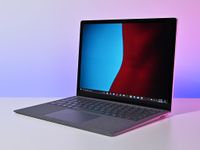Ballmer regrets not redeploying more talent to Windows Mobile in early 2000s
As Microsoft'south 2022 Financial Analyst Meeting wraps upwards, outgoing CEO Steve Ballmer fielded questions from the audition of investors about the visitor. In responding to i inquiry near Microsoft, its direction and reorganization, Ballmer had an interesting confession regarding the last decade at Microsoft.
Although Ballmer has previously best-selling that Vista was something he wished he handled differently, in this evening's response he was even more specific. Ballmer regrets not putting more resources into what was and then Windows Mobile. Instead, the visitor had invested its talent and resources into Vista, an OS that would forever blemish the reputation of the company.
It would also cause Microsoft to miss the mobile explosion just a couple years later on.
Ballmer's response during the Fiscal Analyst Meeting:
"If there'southward one thing I judge you lot would say I regret, I regret that at that place was a menstruum in the early 2000s when we were so focused on what we had to practice effectually Windows that we weren't able to redeploy talent to the new device called the phone. That is the thing I regret the most. The time nosotros missed is the time we were working on what became Vista and I wish nosotros had resources slightly differently deployed. Information technology would take been better for Windows and our success in other class factors."
Indeed, Windows Mobile (and Windows Pocket PC earlier that) was way ahead of its time. Back in 2002, it was Dell leading the way with the Axim X5. That device was spec'd with a 300 MHz Intel XScale processor, 32 MB RAM, 32 MB flash ROM, a Blazon II CompactFlash slot, an SD/MMC slot, a sixteen-flake QVGA (240 × 320 dots) TFT. Toll? $279. While that device and subsequent Axims and iPaqs that came after it remained a niche, it was clearly the futurity and Microsoft at the time owned the market.
Microsoft spent merely a lilliputian time and money with Windows Mobile in subsequent years, going through a few iterations and stumbling around with non-bear on versions of the Os. While the phones at the time were impressive, it was Apple tree's iPhone that made that industry take off due to its appeal to the masses. Unfortunately at the time, Ballmer famously mocked Apple, noting that they welcomed the challenge and that the iPhone was "non a smartphone". Ironically, Apple is doing very well years later on and it is at present Microsoft who is scrambling to take hold of up.
There is no argument that Microsoft had missed an opportunity. They focused on desktop when they should accept seen mobile every bit the next big thing. Will they be able to improve? We sure hope so.

History catches up
The problem for a consumer HoloLens was ever the lack of Windows Phone
What is the future for Microsoft (and Windows) mixed reality? The latest report from Business Insider sheds some light, but this all comes dorsum to 1 major problem for Microsoft: No mobile Windows Bone. Only what about a future headset that is deject-based? Some thoughts on what could happen for Microsoft mixed reality.

Buyer'south guide
All our picks for the very best laptops with USB-C ports
Looking for a new laptop that has USB-C ports? Perhaps you need Thunderbolt 4, or possibly Thunderbolt 4 isn't a requirement for you. Either mode, we've rounded upwards what nosotros remember are the all-time USB-C laptops available to buy today.
Source: https://www.windowscentral.com/ballmer-regrets-no-talent-dedicated-windows-mobile
Posted by: johnsonlossion.blogspot.com


0 Response to "Ballmer regrets not redeploying more talent to Windows Mobile in early 2000s"
Post a Comment